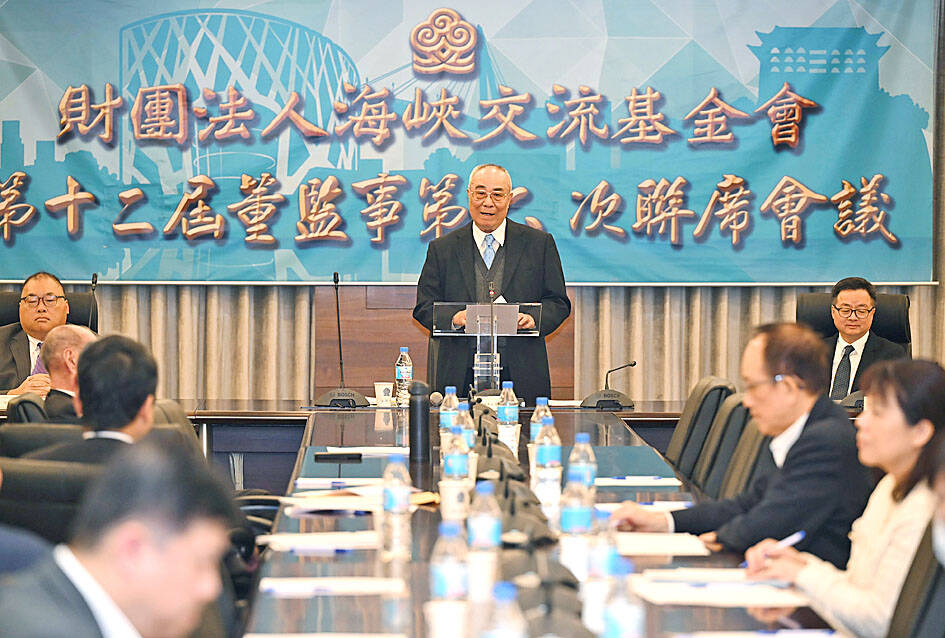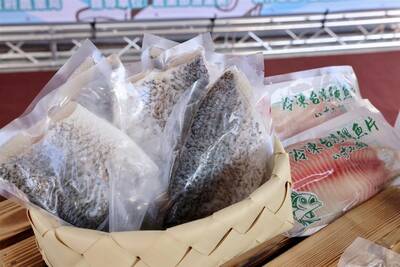The Chinese Communist Party (CCP) does not interact with the ruling Democratic Progressive Party (DPP), preferring instead to go through opposition parties and local governments, Straits Exchange Foundation (SEF) Chairman Frank Wu (吳豊山) told the foundation’s board yesterday.
Wu in his address said that efforts are still ongoing to promote cross-strait peace and to communicate with the foundation’s Chinese counterpart, the Association for Relations Across the Taiwan Straits.
Dialogue with the association has been suspended since 2016, when Tsai Ing-wen (蔡英文) won the presidential election, with Beijing saying that Tsai did not complete a test paper on the so-called “1992 consensus,” Wu said.

Photo: Chang Chia-ming, Taipei Times
“President William Lai (賴清德) in his inaugural address on May 20 last year stated that the Republic of China (ROC) Taiwan and People’s Republic of China are not subordinate to each other. The Chinese side interpreted it as promoting the concept of ‘Taiwan and China as two countries,’ which they would not accept,” Wu said.
The “1992 consensus” — a term that former Mainland Affairs Council chairman Su Chi (蘇起) in 2006 admitted making up in 2000 — refers to a tacit understanding between the Chinese Nationalist Party (KMT) and Chinese leaders that both sides of the Taiwan Strait acknowledge that there is “one China,” with each side having its own interpretation of what “China” means.
Wu took helm of the SEF in November last year, saying at the time that leaders on both sides advocate for peaceful engagement.
China’s Taiwan Affairs Office (TAO) in response said that dialogue could only resume based on the “1992 consensus.”
“I replied that if some sort of ‘consensus’ was agreed upon in 1992, then this agreement still must have a place for the ROC... So the Chinese side must state clearly, that in their interpretation of the ‘1992 consensus,’ where is the ROC?” Wu said.
In November last year, a TAO spokesperson explained it as “finding common ground among differences and setting aside disputes,” but Wu said that in the more-than-700-word explanation, not one word explained the ROC’s position.
The Taiwanese government does not want to quarrel about the “1992 consensus,” Wu said.
“We are only now talking about this issue to show that the Chinese side is using the ‘1992 consensus’ as a ludicrous pretext for not restarting dialogue,” he said. “Since the Chinese side could not explain the ROC’s position under the consensus, that clearly should be end of the dispute.”
“Lai’s address at his inauguration clearly stressed that he wishes for Taiwan and China to start dialogue instead of confrontation,” he said. “Therefore, it is the SEF’s aim to follow Lai’s directives.”
However, Beijing has deliberately chosen to only cooperate with opposition parties and local governments, he said, adding that “this is not open and upfront conduct as a self-proclaimed ‘great nation’ would do.”
The cross-strait situation also involves interaction between the US and China, Wu added.
“The US, China and other nations all know that peace is the only way for a bright future,” he said. “So I am willing to take a cautious, but optimistic stance on developing new cross-strait relations.”

Taiwan's Vice President Hsiao Bi-khim (蕭美琴) said Saturday that she would not be intimidated by the Chinese Communist Party (CCP), following reports that Chinese agents planned to ram her car during a visit to the Czech Republic last year. "I had a great visit to Prague & thank the Czech authorities for their hospitality & ensuring my safety," Hsiao said on social media platform X. "The CCP's unlawful activities will NOT intimidate me from voicing Taiwan's interests in the international community," she wrote. Hsiao visited the Czech Republic on March 18 last year as vice president-elect and met with Czech Senate leadership, including

There have been clear signs of Chinese Communist Party (CCP) attempts to interfere in the nationwide recall vote on July 26 in support of Chinese Nationalist Party (KMT) legislators facing recall, an unnamed government official said, warning about possible further actions. The CCP is actively involved in Taiwanese politics, and interference in the recall vote is to be expected, with multiple Chinese state media and TAO attempts to discredit the Democratic Progressive Party (DPP) and undermine public support of their recall movement, the official said. This interference includes a smear campaign initiated this month by a pro-Beijing Hong Kong news outlet against

A week-long exhibition on modern Tibetan history and the Dalai Lama’s global advocacy opened yesterday in Taipei, featuring quotes and artworks highlighting human rights and China’s ongoing repression of Tibetans, Hong Kongers and Uighurs. The exhibition, the first organized by the Human Rights Network for Tibet and Taiwan (HRNTT), is titled “From the Snowy Ridges to the Ocean of Wisdom.” “It would be impossible for Tibetans inside Tibet to hold an exhibition like this — we can do it. because we live in a free and democratic country,” HRNTT secretary-general Tashi Tsering said. Tashi Tsering, a Taiwan-based Tibetan who has never

A first shipment of five tons of Taiwan tilapia was sent from Tainan to Singapore on Wednesday, following an order valued at NT$600,000 (US$20,500) placed with a company in the city. The products, including frozen whole fish and pre- cooked fish belly, were dispatched from Jiangjun Fishing Harbor, where a new aquatic processing and logistics center is under construction. At the launch, Tainan Mayor Huang Wei-che (黃偉哲) called the move a “breakthrough,” marking Taiwan’s expansion into the Singaporean tilapia market. Taiwan’s tilapia exports have traditionally focused on the United States, Canada, and the Middle East, Huang said, adding that the new foothold in